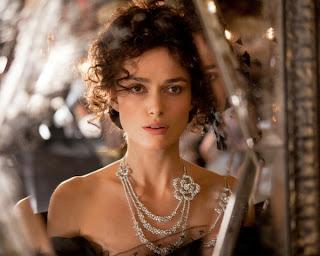As a big fan of the original novel by Leo Tolstoy, I have waited a while to see a film version that truly lives up to the beauty and depth of the source material. And while it has its high points to be sure, Joe Wright's adaptation of Anna Karenina joins the ranks of the previous incarnations: it's uneven. Several excellent performances, especially those of Keira Knightley, Matthew MacFayden, and Domhnall Gleeson, are offset by stunning costumes and an often fascinating, intricately constructed theatrical setting which nicely reflects the artifaces of the Russian society where the story takes place. The transitions between the false veneer of the theater scenes and the lushness of nature (and honesty, and integrity) are usually exquisitely rendered. It is this conceit and those performances which elevate the otherwise standard, Cliff's Notes version of Tolstoy's lengthy tale. It would probably take at least three hours to do real justice to Anna Karenina, yet at two hours and ten minutes, this version feels both curtailed in terms of missing pieces, and sometimes too dragging due to its overindulgence in certain parts of the story that do not need such lavish treatments. For example, a viewer unschooled in the novel would be hard-pressed to identify characters such as Levin's brother Nikolai or Countess Lydia, as rapidly ushered in and out of the events as they are. Yet we spend an inordinate time on Anna's meeting Countess Vronsky on the train, a scene which to my recollection is entirely skipped over and quickly summed up in retrospect in the novel. Still, at least the plotline of Levin and Kitty (Alicia Vikander), too often near-fast-forwarded through in other adaptations, gets a decent shake here. Kitty's personality is not fully explored, but her love story with Levin has some truly sweet and rewarding moments, while Levin's basic predicaments are gone over in at least some decent detail. The Oblonsky side of the story is so marvelously entertaining that one often becomes impatient to return to it, with MacFayden's nonchalantly philandering husband waxing jolly while Dolly (Kelly McDonald) tries to pick up the pieces. The biggest contradiction on display here is the incredibly fine work by Keira Knightly as the often foolish and neurotic, yet sympathetic Anna, versus the sometimes wince-worthy behavior of Aaron Taylor-Johnson as Vronsky. It's not just that Vronsky should be startlingly handsome and manly, while Taylor-Johnson resembles a scenester dandy in his absurd hair and wardrobe. The other issue is the weakness of the actor's portrayal, wherein Vronsky is sometimes detestably wishy washy and pretentious. The Vronsky of the novel may often be superficial and simplistic, but those qualities are offset by his powers of charm, attraction, and romance. As Karenin, a man often hateful in his petty, insanely short-sighted views of the world, yet sympathetic in his vulnerabilities, Jude Law gives the solid performance anyone would expect from an actor of his magnitude. In fact, relieved of the balding, aging persona foisted upon him by the role of Karenin, the typically gorgeous, seductive Law would have been a wonderful Vronsky. And as for the thematic flourishes of the theater versus the outside world, while they are most often lovely, where they stumble it is painfully apparent. Take, for example, the weird moments where it seems as if the characters are about to break into a Sweeney-Todd style song (Oblonsky's barber scene, et al). One fantastic ballroom scene reveals how the discomfortingly overly complicated dance moves serve the subtext of Anna and Vronsky's first dance while Kitty looks on. Yet while Wright is capable of such glimmers of lovely drama in some places, he also places silly, broad moments of unnecessary "humor" where they don't work, such as the nose-blowing and flatulent man who interrupts the Levin/Kitty proposal scene. Sometimes, in trying to embellish the scenes with the farcical qualities of comedic theater, Wright loses the thread of the elegance (forced though it often is, and that's the point) of the original story. One could argue for the virtue of reinforcing the rougher edges of Levin's country life, but those crude moments are just not needed and feel irritating. Luckily, they are fleeting. One of the benefits of the theatre/real world dichotomy is how it emphasizes the extent to which the characters, having lived so long in a stiffly artificial society, cannot grasp the intensities of human emotion. Emotion, once discovered, repulses Karenin, motivates Levin and Kitty, confounds the Oblonskys, and dooms Anna and Vronsky. Speaking of that doom, the final train scene in this version is one of the more visceral interpretations, and it truly brings home the tragic nature of Anna's collapse. With her wide, deer-in-headlights eyes overflowing with forbidden love, and later unbearable misery, Knightley deserves an Oscar for her spot-on portrayal of Anna. While the rest of the movie does not always prove the perfect backdrop for her performance, its best moments are certainly strong enough to make its lesser points recede upon recollection. 9 pink flowers out of ten.
Entertainment Magazine
A Review of the Film Anna Karenina (2012)
Posted on the 10 December 2012 by Virginiamae @SugarRushedBlogAuthor's Latest Articles
-
The Grant Ward Conundrum: Analyzing the Complex Role of One of SHIELD's Best Characters
-
New Pop Reviews: Cheryl Cole, Ella Henderson, Robyn and More!
-
Me. I Am Mariah...The Elusive Chanteuse - Quick Review and Favorite Tracks
-
A Review of Revolution, Episodes 2x21-22, "Memorial Day" and "Independence Day"

